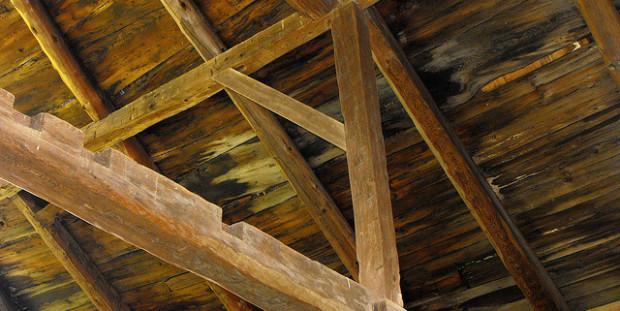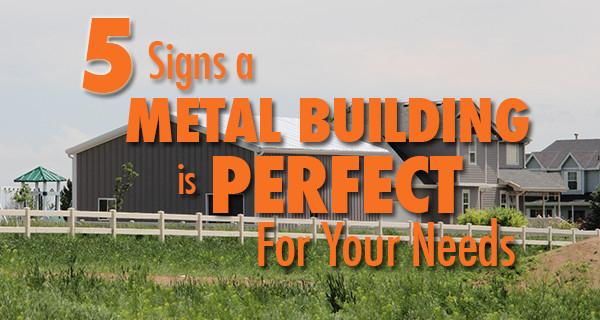What Do You Absolutely Need to Know about Pole Barns?

Are you trying to decide between a pole barn and a pre-engineered steel building? It can be a difficult decision if you don’t do any research. You may not even know the difference between the two and that’s OK right now. As a first time builder, you’re probably just starting to do some research so you can look into all types of building materials. The preparation and research phase of your building experience can be extremely beneficial – especially if it ends up saving you time and money.
Take a look inside
First and foremost, a pole barn is generally built with wood. Wood structures are usually cheaper than other building materials. In construction, ‘you get what you pay for,’ and a cheap building might have much more costs down the road.
Pole barns are practical applications when your span is less than 40 feet. Pole barns with less than 40 feet spans might not require an internal support column or pole. For any applications larger than 40 feet, a pole barn will absolutely need some kind of interior support system. In addition, most every pole barn requires a truss and cord system in the roof. You’ve seen this type of support before. Trusses are “V” shaped support systems that brace the walls and roof of a pole barn. Trusses take up a majority, if not all, the space in the ceiling of a pole barn.
Pre-engineered steel buildings don’t require internal poles, or truss and cord systems. Why not? It’s all in the engineering. A clear span steel building is engineered to transfer loads from the roof and walls, all the way down to the foundation, no matter how big the span. All the space, every last square foot, is able to be utilized by the user.
How long will it last?
Should you build a pole barn, you might find yourself spending more money in the future on repairs. Wood isn’t as durable as steel. This means wood is susceptible to many elements such as water, fire, and it also is extremely susceptible to termites and insects. How long will a pole barn last? Will a pole barn last 20, maybe 30 years? Armstrong Steel offers a 50-year structural warranty on all steel buildings produced in its manufacturing plant.
Speaking of durability and standing up to the elements, did you know that steel is considered a noncombustible material? According to the International Building Code, “a noncombustible material will not ignite or burn when subjected to heat.” Steel is permitted in fire resistive (Type 1) and noncombustible (Type 2) levels on the relative fuel load scale. The other three categories are considered combustible and contain more wood and more combustibility as they are ranked further down the list. For example, a wood frame (Type 5) building will be the most combustible and will have the least resistance to fire. Of course, it’s a good idea to install proper fire safety equipment in your pre-engineered steel building, but should a fire break out, your pre-engineered steel building won’t encourage the spread of fire.
Seal the deal
A pole barn, like all building types, is also extremely susceptible to moisture. The difference between a wood and steel building? Moisture could cause wood to rot, which in turn could severely weaken a wood structure. You intend to invest money into a structure and you expect your investment to protect you and your property, right? Not only could moisture cause rot, but it is one of the main ingredients to grow mold.
You can avoid or greatly reduce the chances of these dangers by building a pre-engineered steel building. Steel has a high resistance to heat, can’t rot like wood, doesn’t provide an organic food source for mold, and even termites can’t feed on it. It’s possible an abundance of moisture can cause rust on steel over a long period of time, but many steel building suppliers offer galvanization processes to prevent rust.
Build a solid foundation
Pole barns might not sit on a foundation and therefore, you’ll be putting it at the mercy of the soil. Frost heaving, which is when the soil has an upwards swelling during freezing conditions, could affect your building. You don’t want nature to easily affect the integrity of a structure. In addition, you may think that any structure on your property will raise your property value. This actually isn’t always true. Permanent structures have the potential to raise your property value, and without a foundation, your pole barn isn’t considered a permanent structure. Without the proper maintenance, it could become an eyesore and actually hurt your chances of selling your property if you decide to do so in the future.
A pre-engineered steel building usually sits on a foundation. This means a pre-engineered steel building won’t be sitting directly on the soil. Because of your foundation or concrete slab, a pre-engineered steel building will also be a permanent structure and can raise your property values. You won’t have to worry about your building becoming an eyesore because it requires very little maintenance, and is engineered to last for decades. A wood pole barn doesn’t sound like much a bargain anymore, does it?
When you’re looking to purchase a building, be sure to consider the facts. Don’t purchase just based on price and without doing any research. It could cost you much more in the long run.
Interested in learning more about steel buildings and pole barns? Take a look at our other blogs and resources in the Armstrong Steel Network!
Photo courtesy: Putneypics
« Work IN Your Business, Not ON Your Business
A Closer Look at Buying A Steel Building Factory Direct »
Popular Posts

Metal buildings are the best solutions on the market for contractors, first-time builders, and do-it-yourselfers on the market. These durable, virtually maintenance-free solutions come with some amazing benefits. Why is a metal building perfect for your particular needs? 1. You’re sick and tired of repairing your old wooden barn It probably seemed like a good… …

A 2013 report from the Association of General Contractors details something you may already know, construction firms and subcontractors across the nation are turning down new work. The report says that current work for existing clients is keeping small to medium sized contractors as busy as ever. With housing and building starts seeing a dramatic… …

